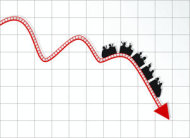 In a post-election panel discussion Monday evening this week, the Economist's Matthew Bishop asked five Washington insiders whether they believe Congress and President Obama will arrive at a deficit reduction plan in time to avoid the so-called fiscal cliff. Tax increases and spending cuts will automatically go into effect in the absence of such a plan on January 1.
In a post-election panel discussion Monday evening this week, the Economist's Matthew Bishop asked five Washington insiders whether they believe Congress and President Obama will arrive at a deficit reduction plan in time to avoid the so-called fiscal cliff. Tax increases and spending cuts will automatically go into effect in the absence of such a plan on January 1.
The panelists at a technology industry conference represented a spectrum of political ideologies: Forbes Media Chairman Steve Forbes, a two-time GOP presidential nominee; Hill + Knowlton Strategies U.S. President and CEO Dan Bartlett, who was White House Communications director under George W. Bush; AOL founder Steve Case, Chairman of President Obama's Startup America Partnership; Markle Foundation President Zoe Baird, former associate counsel to Jimmy Carter and a Clinton nominee for Attorney General; and Andrew Rasiej, the founder of Personal Democracy Media.
All five panelists, Republicans and Democrats alike, said they are optimistic—Case cautiously so—that the nation will not go off the cliff. It seems those insiders have a perspective that journalists and small business owners don't.
Results of separate polls conducted before the election revealed widespread unease among small business owners about the looming sequestration deadline. Respondents to a national telephone poll of 500 owners, conducted by Greenberg Quinlan Rosner Research in October and released last Wednesday, "expressed worry about nearly every fiscal cliff issue they were asked about," according to the Small Business Majority, which commissioned the poll.
More than three-quarters of small business owners polled said they are concerned that an increase in the employee portion of payroll taxes could lead to decreased disposable income and demand from customers, as well as less money in their own pockets, the poll found. According to the Small Business Majority, expiration of the 2 percent Bush-era tax cut on January 1 could cost nearly 1 million jobs and almost a percentage point of economic output in 2013.
In an earlier survey conducted online in September by the Wall Street Journal, nearly half of 833 small business owners had "little confidence that lawmakers and the president will be able to avoid a fiscal cliff by December 31."
But by the end of this week, media reports were reinforcing the Washington insiders' optimism and indicating that small businesses might breathe easier: Though Whitehouse Spokesman Jay Carney told the press that lawmakers are "not near the finish line, by any means," Congressional leaders said Friday that they expect to finalize a deficit reduction plan by year-end. The New York Times called it "a rare show of bipartisan bonhomie" and The Wall Street Journal reported that lawmakers were showing "uncharacteristic optimism." Can small business owners do the same for the next 6 weeks?




